The Producers
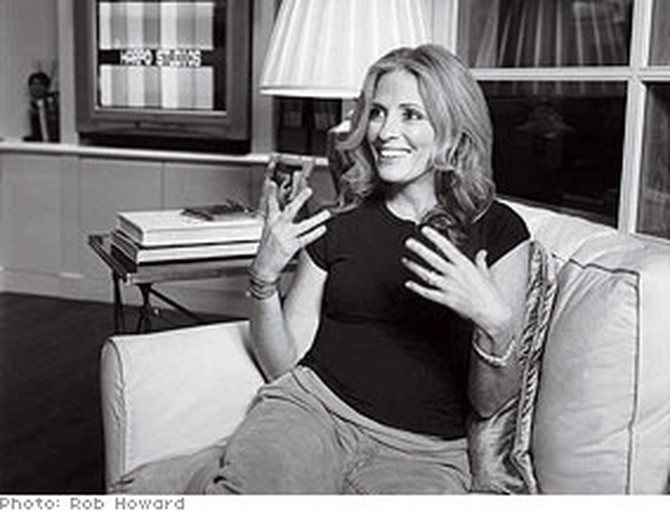
Ellen Rakieten
Executive Producer—started at Harpo in 1986.
I've worked with Oprah since the very first show, and 20 years later she's still, to this second, challenging herself. She's always asking the Harpo team, "How can we get better?" That's why this has never been just a job for me. Every morning I walk into the studio thinking, "Where is Oprah taking us today?" For two decades, I've had a front-row seat in the Live Your Best Life class. What a blessing.
When I look back on more than 4,000 shows, I can't pick just one moment. I remember it all—her big hair, enormous earrings, her brilliance, the love.
Everyone asks me, "What is she really like?" Well, magnify what you see on TV by a thousand, and that's what it is to be with her in person. She is the ultimate girlfriend; she's as fun as they come. Whether we're working, shopping or vacationing, no one can make me laugh like she does. Throw in a few shots of tequila, crank up the music, and she's the life of any party. She's also got the energy of a 20-year-old. The truth is, we're all just trying to keep up.
Executive Producer—started at Harpo in 1986.
I've worked with Oprah since the very first show, and 20 years later she's still, to this second, challenging herself. She's always asking the Harpo team, "How can we get better?" That's why this has never been just a job for me. Every morning I walk into the studio thinking, "Where is Oprah taking us today?" For two decades, I've had a front-row seat in the Live Your Best Life class. What a blessing.
When I look back on more than 4,000 shows, I can't pick just one moment. I remember it all—her big hair, enormous earrings, her brilliance, the love.
Everyone asks me, "What is she really like?" Well, magnify what you see on TV by a thousand, and that's what it is to be with her in person. She is the ultimate girlfriend; she's as fun as they come. Whether we're working, shopping or vacationing, no one can make me laugh like she does. Throw in a few shots of tequila, crank up the music, and she's the life of any party. She's also got the energy of a 20-year-old. The truth is, we're all just trying to keep up.
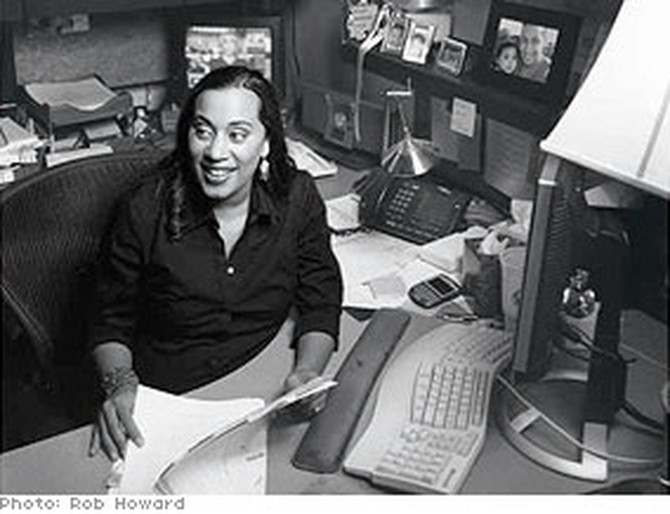
Andrea Wishom
Producer—started at Harpo in 1993.
About four years ago, I produced "The Life of Dr. Martin Luther King Jr." As I prepared, I thought, "All we ever see is the 'I Have a Dream' speech. There's got to be more." With some digging, I discovered archival footage that had never been seen by a national audience. On the tape, Dr. King was interviewed in his home in Atlanta. He cracked jokes, told a story about his daughter wanting to go to an amusement park, and expressed how much he loved Coretta.
After the show aired, viewers wrote things like "I never knew Dr. King was funny" and "I had no idea he was so in love with Coretta." Teachers around the country began using the show in their classrooms. Coretta eventually told Oprah, "This is the first time anyone has ever personalized my husband."
I can't think of a single show that has ever made me feel so proud.
Producer—started at Harpo in 1993.
About four years ago, I produced "The Life of Dr. Martin Luther King Jr." As I prepared, I thought, "All we ever see is the 'I Have a Dream' speech. There's got to be more." With some digging, I discovered archival footage that had never been seen by a national audience. On the tape, Dr. King was interviewed in his home in Atlanta. He cracked jokes, told a story about his daughter wanting to go to an amusement park, and expressed how much he loved Coretta.
After the show aired, viewers wrote things like "I never knew Dr. King was funny" and "I had no idea he was so in love with Coretta." Teachers around the country began using the show in their classrooms. Coretta eventually told Oprah, "This is the first time anyone has ever personalized my husband."
I can't think of a single show that has ever made me feel so proud.
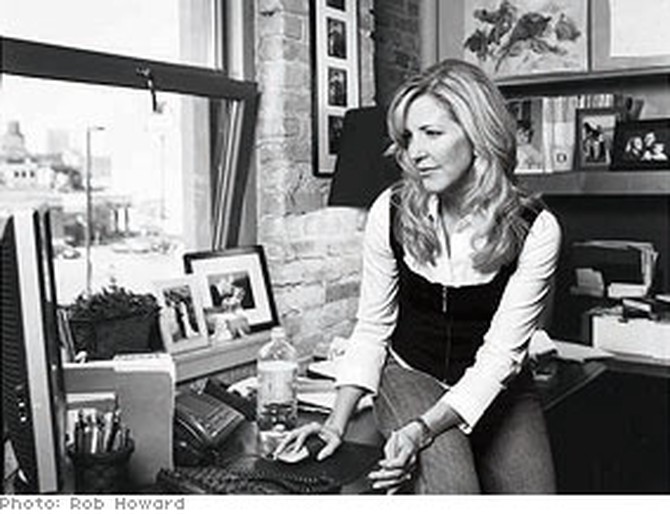
Dana Newton Utigard
Senior Supervising Producer—started at Harpo in 1991.
When the news broke that Susan Smith had pushed her own children into a lake, my executive producer threw me on a plane with another producer so we could tape a show a day and a half later. We drove around town, trying to track down Susan's family members for an interview. Zero progress.
Since none of the family members would talk, we decided to host a town hall show. As emotional as that town meeting turned out to be—people were yelling, crying, and just going crazy—Oprah kept saying, "I just don't see how we're going to turn this into a solid show." But I cut in with a sentence I may never live down: "I feel it in the fiber of my being," I told Oprah. "Well," she said, "I guess I can't argue with the fiber of your being." When the show aired, the ratings skyrocketed. The next day Oprah celebrated with the entire staff and rolled out a big cake shaped like a crow, so she could "eat crow."
My declaration is still something I get teased about—11 years later: "I feel it in the fiber of my being."
Senior Supervising Producer—started at Harpo in 1991.
When the news broke that Susan Smith had pushed her own children into a lake, my executive producer threw me on a plane with another producer so we could tape a show a day and a half later. We drove around town, trying to track down Susan's family members for an interview. Zero progress.
Since none of the family members would talk, we decided to host a town hall show. As emotional as that town meeting turned out to be—people were yelling, crying, and just going crazy—Oprah kept saying, "I just don't see how we're going to turn this into a solid show." But I cut in with a sentence I may never live down: "I feel it in the fiber of my being," I told Oprah. "Well," she said, "I guess I can't argue with the fiber of your being." When the show aired, the ratings skyrocketed. The next day Oprah celebrated with the entire staff and rolled out a big cake shaped like a crow, so she could "eat crow."
My declaration is still something I get teased about—11 years later: "I feel it in the fiber of my being."
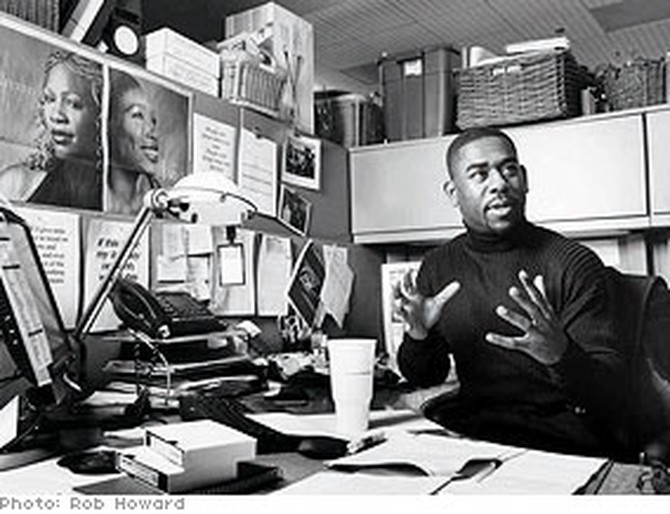
Ray Dotch
Senior Associate Producer—started at Harpo in 1995.
In 2004 we asked John Travolta, the star of Ladder 49, to help us surprise two firemen who'd lived through a moment that was portrayed in the movie—they'd rescued someone trapped inside a burning building. The surprise was to take place at the firehouse, and I had planned for every contingency except one—a real fire. That didn't occur to me until the fire trucks came barreling out of the station as I walked up with John.
I panicked and said, "Try not to look like John Travolta." The "fire" was a false alarm, and the crew returned to the station after 10 (loooong!) minutes. I can still see the shock on the firemen's faces when John said that he was there to fly them to Chicago to appear on the show. Travolta and I standing around on a block in Detroit? I'd call that a moment that nearly spoiled a big surprise. Hearing his voice over the speaker on his private jet? I'd call that one of the coolest experiences of my life.
Senior Associate Producer—started at Harpo in 1995.
In 2004 we asked John Travolta, the star of Ladder 49, to help us surprise two firemen who'd lived through a moment that was portrayed in the movie—they'd rescued someone trapped inside a burning building. The surprise was to take place at the firehouse, and I had planned for every contingency except one—a real fire. That didn't occur to me until the fire trucks came barreling out of the station as I walked up with John.
I panicked and said, "Try not to look like John Travolta." The "fire" was a false alarm, and the crew returned to the station after 10 (loooong!) minutes. I can still see the shock on the firemen's faces when John said that he was there to fly them to Chicago to appear on the show. Travolta and I standing around on a block in Detroit? I'd call that a moment that nearly spoiled a big surprise. Hearing his voice over the speaker on his private jet? I'd call that one of the coolest experiences of my life.
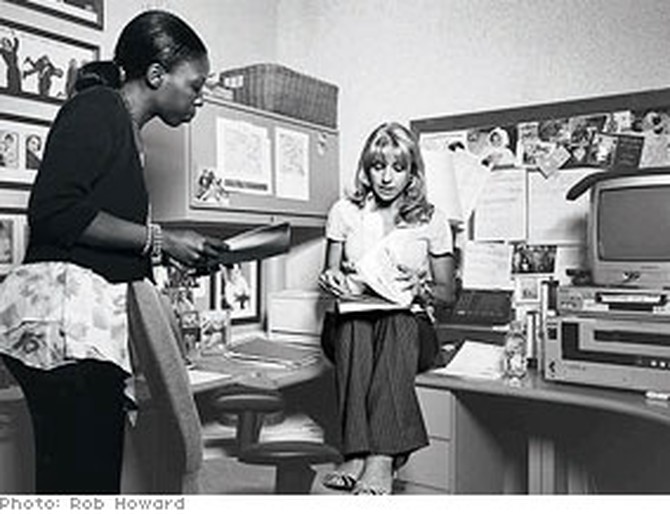
Katy Murphy Davis
Senior Supervising Producer—started at Harpo in 1992.
Just before our summer break in 1997, Oprah talked about her vision for the upcoming season: "I want to use this show to help people make a difference in the world by extending kindness to others." After weeks of thinking about this, I woke up one morning with an idea: Oprah's Angel Network.
One season we encouraged viewers to collect their loose change and donate it to the Angel Network, which would give 50 students $25,000 each to attend college. An 11-year-old boy named Paul, the son of a single mom, had been socking away coins for nine years to pay for a trip to Disney World. When Paul saw our Angel Network show, he decided to donate his life savings to the college students. On the show's 1998 season finale, Paul stood palm in palm with Oprah, tears streaming down his face as he explained what moved him to give up his piggy bank. There wasn't a dry eye in Harpo's control room! After the boy handed over his gift, we surprised him with one of our own—a dream trip to the Magic Kingdom.
Senior Supervising Producer—started at Harpo in 1992.
Just before our summer break in 1997, Oprah talked about her vision for the upcoming season: "I want to use this show to help people make a difference in the world by extending kindness to others." After weeks of thinking about this, I woke up one morning with an idea: Oprah's Angel Network.
One season we encouraged viewers to collect their loose change and donate it to the Angel Network, which would give 50 students $25,000 each to attend college. An 11-year-old boy named Paul, the son of a single mom, had been socking away coins for nine years to pay for a trip to Disney World. When Paul saw our Angel Network show, he decided to donate his life savings to the college students. On the show's 1998 season finale, Paul stood palm in palm with Oprah, tears streaming down his face as he explained what moved him to give up his piggy bank. There wasn't a dry eye in Harpo's control room! After the boy handed over his gift, we surprised him with one of our own—a dream trip to the Magic Kingdom.

Amy Coleman
Senior Producer—started at Harpo in 1994.
One of my most profound experiences came in 2001 when we had on Thomas McKean, an autistic man. My sister, Jennifer, is the mother of twins, and one of them—my godson, Sam, who was 5 in 2001—is autistic. That's why Thomas's appearance on the show was such a miracle for me: A man who'd learned to speak when he was a teenager took me inside the mysterious world of autistics. He told me how lonely his world had been when he was a child. He said he'd had to discover what joy, sadness, pain, and anger were and teach himself how to feel. He revealed how exaggerated his sensitivity to color is (yellow, for instance, hurts his eyes) and how challenging being in public is because of his difficulty processing so much information. For Thomas, appearing "normal" has meant teaching himself to behave like others by studying people around him. I'll never forget something Thomas said to me: "I've always been able to love—I just didn't know what love was."
Senior Producer—started at Harpo in 1994.
One of my most profound experiences came in 2001 when we had on Thomas McKean, an autistic man. My sister, Jennifer, is the mother of twins, and one of them—my godson, Sam, who was 5 in 2001—is autistic. That's why Thomas's appearance on the show was such a miracle for me: A man who'd learned to speak when he was a teenager took me inside the mysterious world of autistics. He told me how lonely his world had been when he was a child. He said he'd had to discover what joy, sadness, pain, and anger were and teach himself how to feel. He revealed how exaggerated his sensitivity to color is (yellow, for instance, hurts his eyes) and how challenging being in public is because of his difficulty processing so much information. For Thomas, appearing "normal" has meant teaching himself to behave like others by studying people around him. I'll never forget something Thomas said to me: "I've always been able to love—I just didn't know what love was."
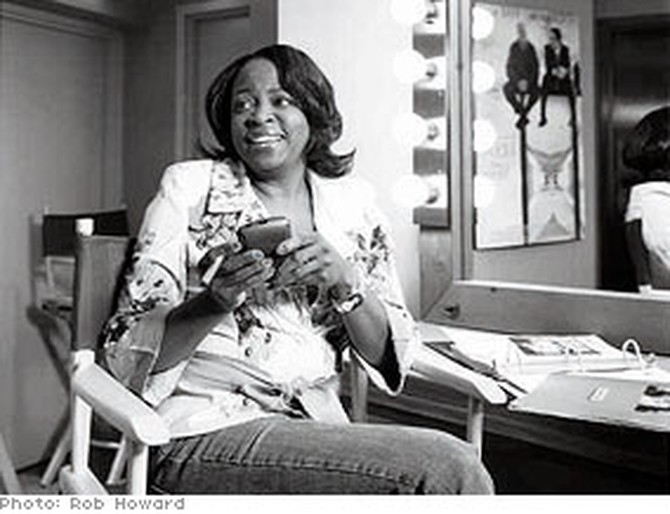
Lesia Minor
Senior Associate Producer—started at Harpo in 1986.
I work on many of the Nate Berkus shows, and in 2004, we began a makeover of actress Kirstie Alley's home. For the first time, we were adding an entire room to a house. It went smoothly—until the contractor quit two and a half weeks before completion. Not only did Kirstie have a huge hole in her backyard, but there were no kitchen cabinets, appliances or paint on the walls. Nate and I met with the 50 people working on this project, including employees of Home Depot and Owens Corning HOMExperts, our saviors.
We worked 24/7 for two weeks, and even I, a construction newbie, shoveled dirt and installed tile. Though the house turned out to be one of Nate's best makeovers (how can we not love that guy?), it was Kirstie who made the project memorable. Every day she said hello to the crew and fed them—she even made T-shirts for everyone. I was staying with my aunt, but Kirstie suggested I move into her house instead. Every night I found tokens of appreciation from her on my bed. I'm usually the last person to get emotional, but on the final day when I found a necklace and bracelet, I cried. We've been friends ever since.
Senior Associate Producer—started at Harpo in 1986.
I work on many of the Nate Berkus shows, and in 2004, we began a makeover of actress Kirstie Alley's home. For the first time, we were adding an entire room to a house. It went smoothly—until the contractor quit two and a half weeks before completion. Not only did Kirstie have a huge hole in her backyard, but there were no kitchen cabinets, appliances or paint on the walls. Nate and I met with the 50 people working on this project, including employees of Home Depot and Owens Corning HOMExperts, our saviors.
We worked 24/7 for two weeks, and even I, a construction newbie, shoveled dirt and installed tile. Though the house turned out to be one of Nate's best makeovers (how can we not love that guy?), it was Kirstie who made the project memorable. Every day she said hello to the crew and fed them—she even made T-shirts for everyone. I was staying with my aunt, but Kirstie suggested I move into her house instead. Every night I found tokens of appreciation from her on my bed. I'm usually the last person to get emotional, but on the final day when I found a necklace and bracelet, I cried. We've been friends ever since.
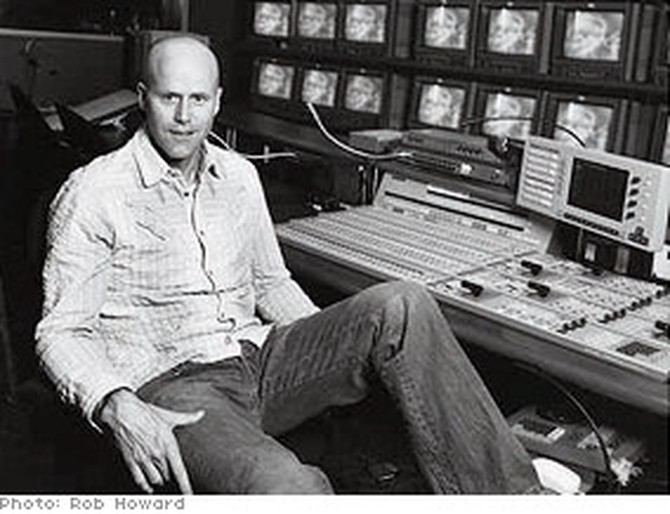
Jim Kelley
Senior Associate Producer—started at Harpo in 1990.
I'll never forget Gladys Finley—a Chicago teacher who'd asked Oprah for tickets back when the show was still local. Oprah had written Gladys back, telling her to call for tickets anytime she wanted. In 1992, years after the show had gone national, Gladys sent us a copy of Oprah's signed reply. She requested tickets for a particular date—a holiday when she knew her school, which was across the street from her house, would be closed. On that day, we had planned to air what we call a letters show, a roundup of viewers' correspondence to Oprah. We decided to send a limo to pick up Gladys from her home and hire a helicopter to film the limo heading toward the Harpo building. Then we thought, if we're going to hire a helicopter, why not just fly Gladys to Harpo?
While Oprah was hosting the live letters show in the studio, I rang Gladys's doorbell and handed her a cell phone. "Gladys, get your coat and bag," Oprah said on the cell. "We want to see you by the end of this show, okay?" The helicopter flew her to a pad near Harpo, and moments later her limo pulled up to our building. Gladys nearly ruined it when she tried to dash into the studio in the middle of a commercial break. Our security guy had to nab her at the door. When she finally came onto the set, she got a rock-star reception as the crowd went wild.
Senior Associate Producer—started at Harpo in 1990.
I'll never forget Gladys Finley—a Chicago teacher who'd asked Oprah for tickets back when the show was still local. Oprah had written Gladys back, telling her to call for tickets anytime she wanted. In 1992, years after the show had gone national, Gladys sent us a copy of Oprah's signed reply. She requested tickets for a particular date—a holiday when she knew her school, which was across the street from her house, would be closed. On that day, we had planned to air what we call a letters show, a roundup of viewers' correspondence to Oprah. We decided to send a limo to pick up Gladys from her home and hire a helicopter to film the limo heading toward the Harpo building. Then we thought, if we're going to hire a helicopter, why not just fly Gladys to Harpo?
While Oprah was hosting the live letters show in the studio, I rang Gladys's doorbell and handed her a cell phone. "Gladys, get your coat and bag," Oprah said on the cell. "We want to see you by the end of this show, okay?" The helicopter flew her to a pad near Harpo, and moments later her limo pulled up to our building. Gladys nearly ruined it when she tried to dash into the studio in the middle of a commercial break. Our security guy had to nab her at the door. When she finally came onto the set, she got a rock-star reception as the crowd went wild.
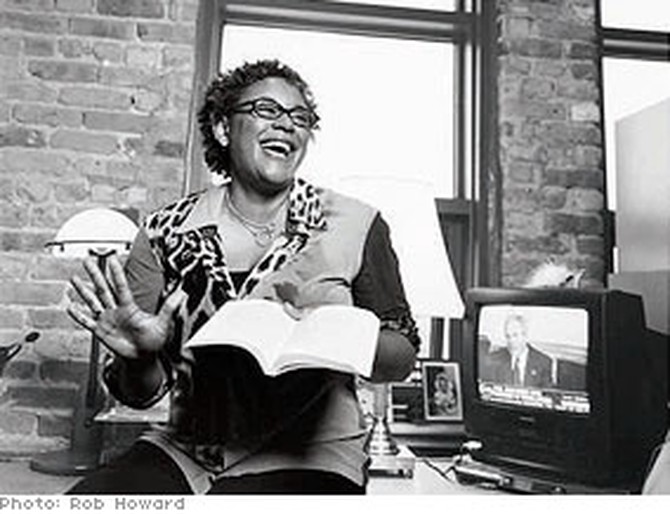
Jill Adams
Senior Associate Producer—started at Harpo in 1992.
In 1994 we aired "The Woman Who Smelled Bad at Work" —a show based on a Wall Street Journal piece. We brought in a smell expert to help us see if people would react to someone who smelled bad. Our plan was to have a volunteer sit in the audience holding area, carrying a foul-smelling napkin (planted by our expert) in her pocket as our hidden cameras recorded bystanders.
While our expert was in a back hallway saturating the cloth with his chemical stench, he happened to be standing underneath a central air intake unit. We soon found out that bad smells make people snippy. Moments after some of our staff caught a whiff—they hadn't known of our experiment that day—they were walking around snapping at each other. As the putrid odor wafted into the offices, staff members began gasping, hyperventilating and running out of the building. Luckily, the horrible smell didn't go into the studio, and the audience wasn't subjected to it.
Senior Associate Producer—started at Harpo in 1992.
In 1994 we aired "The Woman Who Smelled Bad at Work" —a show based on a Wall Street Journal piece. We brought in a smell expert to help us see if people would react to someone who smelled bad. Our plan was to have a volunteer sit in the audience holding area, carrying a foul-smelling napkin (planted by our expert) in her pocket as our hidden cameras recorded bystanders.
While our expert was in a back hallway saturating the cloth with his chemical stench, he happened to be standing underneath a central air intake unit. We soon found out that bad smells make people snippy. Moments after some of our staff caught a whiff—they hadn't known of our experiment that day—they were walking around snapping at each other. As the putrid odor wafted into the offices, staff members began gasping, hyperventilating and running out of the building. Luckily, the horrible smell didn't go into the studio, and the audience wasn't subjected to it.
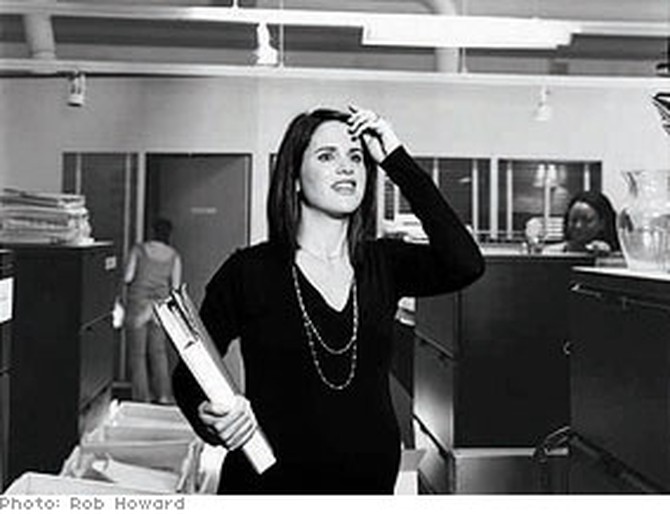
Jennifer Stamper
Senior Associate Producer—started at Harpo in 1996.
When Stacey Halprin first appeared on our show in 1987, she weighed 550 pounds and rarely went out in public. The show followed up on her years later, and our hidden cameras recorded the cruelty she endured. Children snickered. People stopped just to hurl insults at her. We watched as she moved through the world, makeup caked on her face to hide her shame; we heard about her moments of humiliation, like when she broke a friend's bed. A few years ago, Stacey underwent gastric bypass surgery and started a steady exercise routine and a healthy diet. She has lost more than 300 pounds and even has her first boyfriend.
For years I'd been one of those women who thought, why can't overweight people just eat less? It wasn't until I heard Stacey's story that I recognized obesity as a disease. I grew up with an overweight mom who'd been on a diet since she was 9 years old; when I was a child, my mom's size embarrassed me. But Stacey's story led me to have a conversation with my mother—to stop and really hear her—and I began to understand her struggles for the first time.
Senior Associate Producer—started at Harpo in 1996.
When Stacey Halprin first appeared on our show in 1987, she weighed 550 pounds and rarely went out in public. The show followed up on her years later, and our hidden cameras recorded the cruelty she endured. Children snickered. People stopped just to hurl insults at her. We watched as she moved through the world, makeup caked on her face to hide her shame; we heard about her moments of humiliation, like when she broke a friend's bed. A few years ago, Stacey underwent gastric bypass surgery and started a steady exercise routine and a healthy diet. She has lost more than 300 pounds and even has her first boyfriend.
For years I'd been one of those women who thought, why can't overweight people just eat less? It wasn't until I heard Stacey's story that I recognized obesity as a disease. I grew up with an overweight mom who'd been on a diet since she was 9 years old; when I was a child, my mom's size embarrassed me. But Stacey's story led me to have a conversation with my mother—to stop and really hear her—and I began to understand her struggles for the first time.

Dana Brooks Reinglass
Senior Associate Producer—started at Harpo in 1994.
Last December we aired "Around the World with Oprah", an insider's view of how women from various countries live. Women in 16 nations—from the Philippines and Mexico to Brazil and Kuwait—told of societies where females don't enjoy the privileges we sometimes take for granted, such as the right to vote and the freedom to choose a spouse. Since that show, I've stayed in touch with a few of the women. Recently, Zain Al-Sabah, the niece of the current ruler of Kuwait, sent me an e-mail. "Just thought I'd let you know," she wrote. "Today Kuwaiti women have finally won the right to vote!"
I'll never forget what another guest, a woman from Iceland, told me. "When Americans ask each other 'How are you?' they don't expect a real answer," she said. "In Iceland we don't ask that question unless we really want to hear." To this day, I can't ask, "How are you?" without remembering that woman's observation.
Senior Associate Producer—started at Harpo in 1994.
Last December we aired "Around the World with Oprah", an insider's view of how women from various countries live. Women in 16 nations—from the Philippines and Mexico to Brazil and Kuwait—told of societies where females don't enjoy the privileges we sometimes take for granted, such as the right to vote and the freedom to choose a spouse. Since that show, I've stayed in touch with a few of the women. Recently, Zain Al-Sabah, the niece of the current ruler of Kuwait, sent me an e-mail. "Just thought I'd let you know," she wrote. "Today Kuwaiti women have finally won the right to vote!"
I'll never forget what another guest, a woman from Iceland, told me. "When Americans ask each other 'How are you?' they don't expect a real answer," she said. "In Iceland we don't ask that question unless we really want to hear." To this day, I can't ask, "How are you?" without remembering that woman's observation.
From the October 2005 issue of O, The Oprah Magazine

